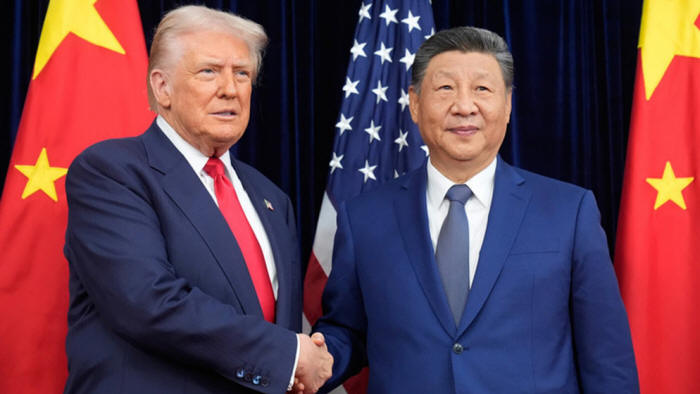|
by Fyodor Lukyanov November 01, 2025 from RT Website
US President Donald Trump and Chinese President Xi Jinping shake hands before their meeting at Gimhae International Airport in Busan, South Korea, October 30, 2025. © AP Photo / Mark Schiefelbein
polite globalization is over
and
civilizations are back...
The well-worn business phrase "push and pull" neatly captures the essence of today's US-China relations.
What once looked like a competitive partnership
has hardened into a contest of wills, power, and identity. One that
will shape the global order for years to come.
Economic interdependence, global markets and single rule-sets were supposed to smooth away historical grievances and cultural differences.
In that vision, civilizational identities - the
deep structures of tradition, culture, and worldview - were treated
almost as relics.
The liberal order began to crack long before Donald Trump entered the White House, but his arrival made the rupture visible and irreversible. As the old framework faltered, the pendulum swung back toward identity, difference, and civilizational self-assertion.
The question now is not whether this shift is happening, it clearly is, but how the world will function within it.
In less than a year in office, he changed not only American diplomacy but the global expectations surrounding it. Washington, under Trump, rediscovered a bluntness that previous generations tried to bury under layers of institutional polish.
Either way, it has been effective in forcing other players to adjust.
"Peace through strength," long a core American formula, now translates into coercive bargaining, tariff threats, open blackmail, and public humiliation of rivals and allies alike.
The administration has embraced this as a
governing philosophy. Diplomacy is a battlefield; hesitation is
weakness; and courtesy is optional.
The "farmer republic" instincts that 19th-century observers attributed to America - confidence in one's rightness, suspicion of subtlety - are back on display.
Trump is proud of this. And whether one likes it
or not, he remains leader of the most powerful country on earth.
Everyone must factor that reality into their strategies.
As President Vladimir Putin has implied, it is simpler to negotiate with someone who states his demands plainly than with a smiling technocrat who buries intent under abstractions.
But bluntness without proportion is dangerous, and Trump often treats diplomacy as if it were a television stage. Where escalation is drama rather than consequence.
Culturally, the two powers could not be more different.
Where Trump prizes dominance and spectacle, Beijing values continuity, disciplined patience, face-saving compromise, and a belief in gradual, managed evolution.
China entered the global system expecting mutual
benefit and predictable rules. It did not expect, and doesn't
particularly like, the American turn toward open intimidation.
Trump's second term disabused them. The pressure
is heavier, the confidence greater, and the provocations more
deliberate. China has responded in kind, abandoning its previously
understated posture for sharper language and reciprocal signaling.
This phase - coercion versus resolve, threat versus counter-threat - is no temporary disruption.
It is the 'new normal'...
Each side will test how much harm it can threaten without tipping into disaster.
This is not a new Cold War.
Today's world is not bipolar:
But the central axis of the transformation is US-China divergence.
The symbiosis of interests that defined the last
forty years has ended. Interdependence is now a battlefield, not a
stabilizing force.
After Trump?
The decisive variable will not be ideology but power distribution.
The only certainty is that,
Globalization's most ambitious phase is over.
A world of civilizational players - sometimes
cooperating, often competing - has arrived, and the relationship
between the United States and China will define its contours more
than any other single factor...
|


